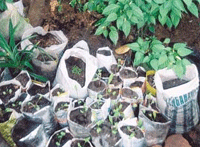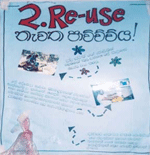:: Specific Design Brief
ITDG
1: Sustainability campaign
- further information
GRAPHIC DESIGN SRI LANKA
- THE STORY SO FAR
WASTE MANAGEMENT IN GALLE, SRI LANKA
Galle is a large town in the southern province of Sri Lanka. Waste dumping has long been a problem and has created health and environmental issues within the community. The size of the problem has increased in recent years as the relative proportion of paper, glass and plastics as a percentage of total waste has increased.
PLASTIC WASTE. Plastics create particular problems as they resist decay and can take centuries to break down naturally. Habit means that plastic waste is often thrown into the street where it accumulates and attracts vermin and insects which in turn spread disease. Since biodegradable waste is also commonly thrown onto the street this too can produce chemical reactions that leave environmental and health problems. Water and food are contaminated and in some areas there are high rates of dengi fever.
PLASTIC RECYCLING is a complicated process and has often not been thought to be economically cost-effective because of high levels of impurity in household waste. Impurities result because plastics are not sorted properly. Some may contain a mixture of plastics, others have additives that reduce the purity of recycled material. Often several different types of plastics are collected together, making sorting critical and potentially expensive. If plastics could be sorted and collected within households, the problem of mixed plastics would potentially be overcome. Separation into Low Density Plastic (LDP), High Density Plastic (HDP) Polypropylene (PP) and Polythylene (PE) in the households therefore makes sense.
 A
COMMUNITY WASTE MANAGEMENT SYSTEM.
A
COMMUNITY WASTE MANAGEMENT SYSTEM.
Pushpa Nilathi is the Manager of the Arthacharya Foundation in
Galle. The organisation was established to work with the local
council (called Municipal Councils in Sri Lanka). The foundation began working
with some low income community groups in the Dadella area of Galle to encourage
them to collect plastic waste at household level, ensure it was properly
separated, and then to work as a co-operative group to recycle it into pellets
for re-sale. They also encouraged the groups to collect and compost their
organic waste.
At first, three community groups, usually comprising mostly women, were chosen to be involved. It was so successful that within two years, the community involvement had doubled.
THE
SUCCESS STORY.
Some of the factors showing its success are
� There has been no dengi fever in the project area for the last 18 months
� The cost of collecting waste to the Municipal Council has fallen dramatically
� The community groups are able to sell compost produced from their organic
waste.
� The price at which they can sell compost has doubled in two years as people
have realised its quality
� Each community group has formed a children�s branch, all 5 to 15 year olds in
the community being members who are educated about waste and participate both in
collection and recycling
� People in the communities are proud of their progress and the improvement in
the environment in which they live
� Untreated plastics can be sold for 8 rupees per kg. Coloured polythene pellets
sell for 35 rupees and colourless for up to 45 rupees
� The average income per household involved is 650 rupees with a much better
quality of life as a result � three meals a day are now common whereas
previously one was more likely.
� Children can now go to school because parents can afford the fees
� There is a much greater sense of community. They work together on committees.
With the youth programme, and in bargaining with the Municipal Council and
buyers of the plastic.
� The status of the women involved has gone up. Men were initially hostile to
them being committee members are would try to force them not to attend. Now the
men drop women at the committee meetings and look after children whilst they are
away.
� Habits have changed fundamentally � waste is now seen as a source of income.
The message is, �Solid waste is money, don�t throw it away.�
 EXTENDING THE PROGRAMME
EXTENDING THE PROGRAMME
Pushpa and her team are delighted with the success so far but want to extend the
system into more areas of Galle and elsewhere in Sri
Lanka. However, doing so has proved more difficult than they imagined. So, they
are looking for ways in which they can attract more communities to follow the
lead. They have already developed some publicity ideas for themselves but are
also hopeful that some other ideas may result from SDA. They believe there are a
number of different possibilities.
TARGET AUDIENCES
� The general population of Galle. Although the scheme targeted poor
communities, there is no reason why a wider population should not be involved in
waste management schemes. It might be that the community groups could offer a
collection system into wealthier areas. A publicity campaign for the general
public which showed some of the benefits of involvement might attract more
interest. Similarly, a 3D sorting or collection method that also advertised the
scheme would be beneficial. The fewer words involved the better. If necessary,
any text could be translated into the local language, Sinhalese.
� Young people are critical to the future success of any waste management
system. Secondary schools produce their own waste management problems in Sri
Lanka as much as anywhere else. A poster and a 3D prototype for use in secondary
schools could be designed and made.
� Primary school children are also important. They might enjoy learning about
waste from an illustrated story with accompanying pop-up characters or a
card/board game based on collecting and separating waste.
FURTHER INFORMATION:
USEFUL REFERENCES
�